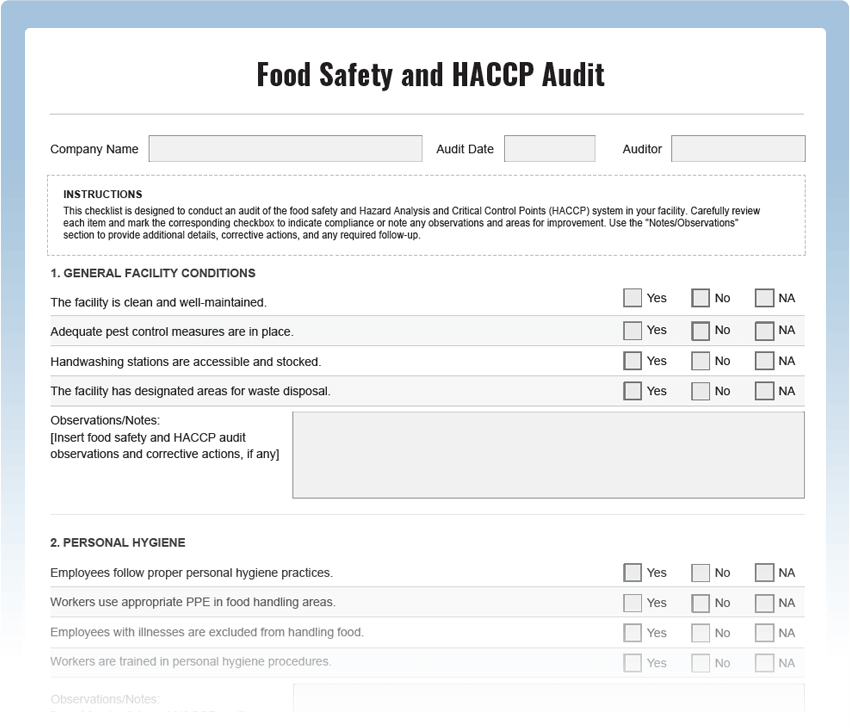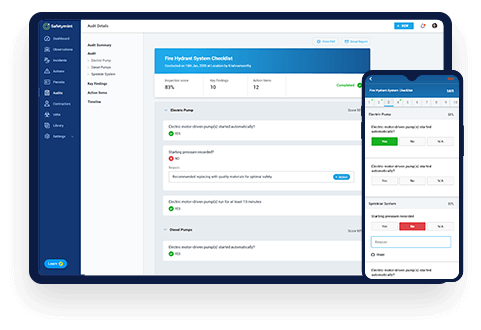Food Safety Inspection Checklist
Ensure the highest standards of food safety and hygiene in your establishment with our comprehensive Food Safety Inspection Checklist. This free PDF template covers all critical aspects of food handling, storage, and preparation, empowering you to maintain compliance with food safety regulations and protect your customers’ health.

Digitize this Checklist on Safetymint
- Create unlimited, customized checklists
- Add Actions, with automated reminders
- Works seamlessly with or without internet
- Access via web browsers, mobile or tablets

What is a Food Safety Inspection Checklist?
A Food Safety Inspection Checklist is a systematic tool used to assess food handling practices, cleanliness, and compliance with food safety regulations. It includes a series of checkpoints designed to ensure that food is prepared, stored, and served in a safe and hygienic manner. Regular food safety inspections are essential for preventing foodborne illnesses and maintaining your reputation as a safe and trusted food establishment.
Key Areas to Inspect in Food Safety:
- Personal Hygiene: Check that food handlers follow proper handwashing and personal hygiene practices.
- Food Storage: Inspect storage areas to ensure proper temperature control and segregation of raw and cooked foods.
- Food Preparation Surfaces: Assess the cleanliness and sanitization of food preparation surfaces and utensils.
- Cooking Temperatures: Verify that foods are cooked to the appropriate internal temperatures to kill harmful bacteria.
- Refrigeration and Cooling: Check refrigerators and cooling processes to prevent bacterial growth and food spoilage.
- Allergen Management: Ensure that allergens are appropriately identified, handled, and prevented from cross-contamination.
- Cleaning and Sanitization: Assess the effectiveness of cleaning and sanitization practices throughout the food establishment.
- Food Safety Training: Verify that staff members have received proper food safety training.
Common Food Safety Hazards:
Failure to address food safety hazards can lead to:
- Foodborne Illnesses: Contaminated food can cause food poisoning and illnesses in customers.
- Cross-Contamination: Improper handling can lead to the transfer of harmful bacteria between foods.
- Allergic Reactions: Inadequate allergen management can result in allergic reactions in sensitive individuals.
- Bacterial Growth: Poor temperature control can lead to bacterial growth and food spoilage.
Food Safety Inspection Best Practices:
- Frequent Inspections: Conduct regular food safety inspections to identify and address potential hazards promptly.
- Training and Education: Provide comprehensive food safety training to all food handlers.
- Corrective Actions: Take immediate corrective actions to address any deficiencies found during inspections.
- Documented Procedures: Maintain clear and accessible procedures for food safety practices.
- Third-Party Audits: Consider engaging in periodic third-party food safety audits for an objective assessment.



